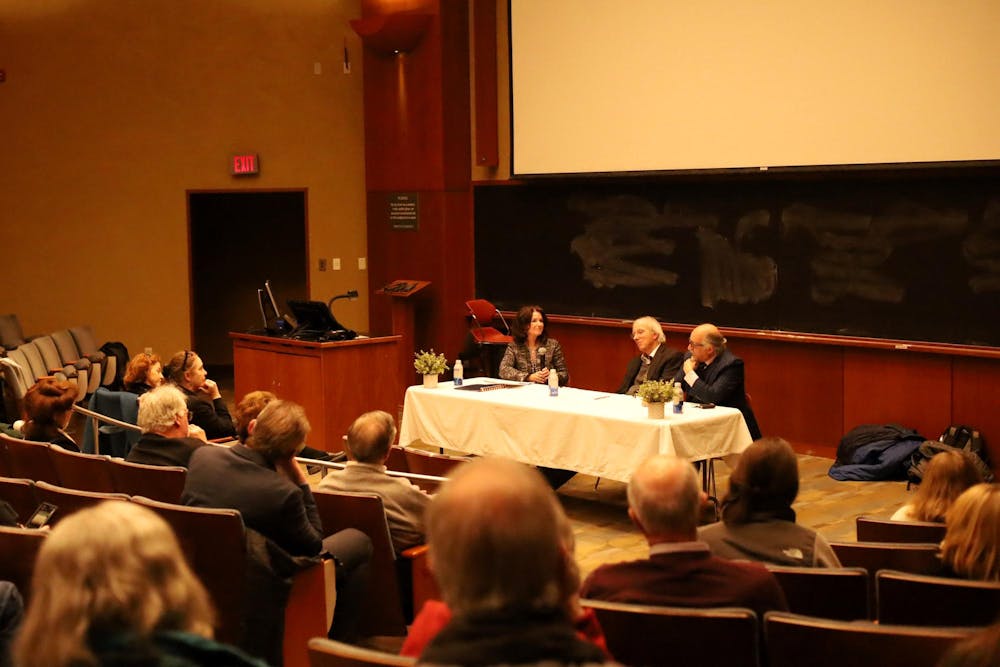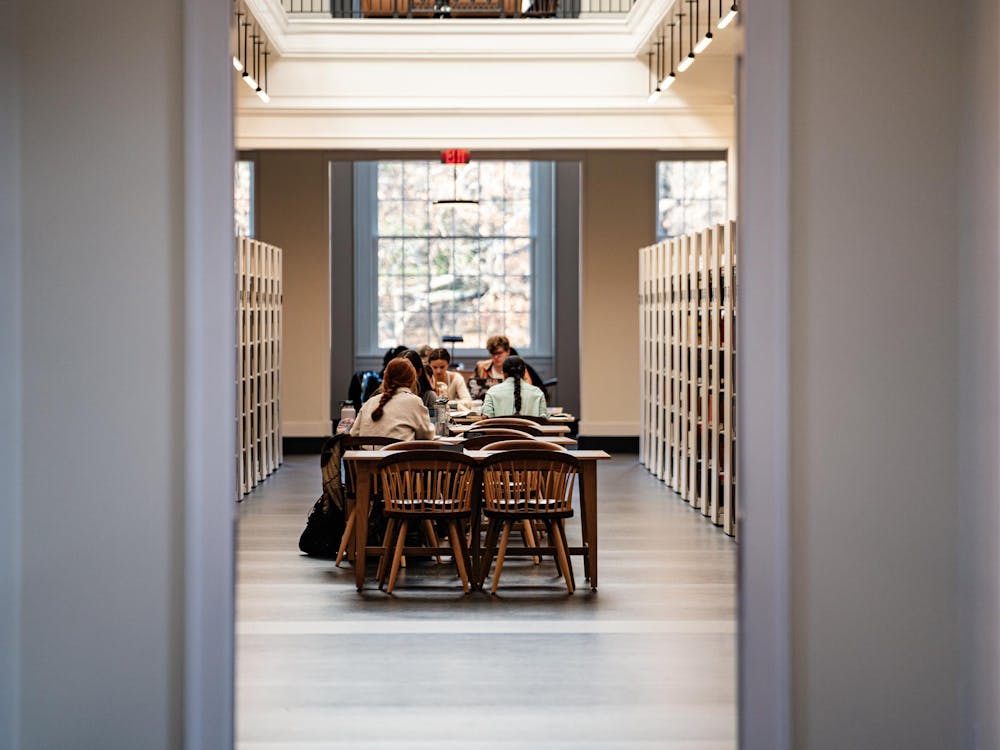Former Middle East peace negotiators Dennis Ross and Gaith al-Omari shared their knowledge of the history of the peace negotiations in the Middle East and their insights for the future of these conflicts Tuesday. The conversation was co-sponsored by the U.Va. Jewish Studies Program and the Middle Eastern and South Asian Languages and Cultures Department, and marked the second event in the College’s Enabling Difficult Conversations Series, a set of discussions and panels aimed at fostering informative and civil discourse on important political issues.
The series kicked off in spring with two Dartmouth professors visiting the University to speak on enabling and navigating difficult conversations on college campuses, specifically surrounding the Israeli-Palestinian conflict. The two professors who spoke at the first event, Tarek El-Ariss and Susannah Heschel, chair Dartmouth’s Middle Eastern Studies and Jewish Studies departments, respectively.
Tuesday’s event had also two speakers, this time with direct experience in peace negotiations in the Middle East. Dennis Ross is a William Davidson Distinguished fellow at the Washington Institute — a think tank focused on advancing American interests in the Middle East. He worked on the Arab-Israeli peace negotiations under the administrations of Presidents George H. W. Bush and Bill Clinton and currently teaches at Georgetown University’s Center for Jewish Civilization.
Ghaith al-Omari is the Rosalinde and Arthur Gilbert Foundation Senior Fellow at the Washington Institute, and his focus is on the U.S.-Israel strategic relationship. He previously served as executive director of the American Task Force on Palestine and as an advisor to the Palestinian negotiating team during the 1999–2001 permanent-status talks.
The conversation began with Christa Acampora, dean of the College of Arts and Sciences and moderator of Tuesday’s conversation, asking the panelists to share their broad insight into how the history of negotiations in the Middle East has shaped today’s diplomatic landscape and what is needed going forward.
Al-Omari emphasized that the historically prevalent perspective of the conflict between Israel and Palestine is one in which one side must win and the other lose. According to Al-Omari, Middle Eastern countries have realized that this viewpoint stunts progress in negotiations.
“I think the decision to move to peace diplomacy [between Israel and Palestine] has been very much based not necessarily on global ideas, but on the realization that all of these attacks and the zero sum [idea are] basically not working,” al-Omari said. “Not only is neither side going to disappear, … but both sides have a very compelling and very true attachment to that same piece of land.”
Ross said he agreed with al-Omari that no conflict in the Middle East has a side who is clearly in the right or wrong and that there is danger in approaching the conflict as zero-sum. He also vouched for the importance of acknowledging the fact that both Israel and Palestine will have to coexist with each other in the end and spoke on how doing so may be possible by shifting one’s mindset.
“By coexisting with the other, what it means is I’m accepting that they will exist,” Ross said. “I’m accepting that when I tolerate this it doesn’t mean I’m engaging in a negation of my own faith.”
Ross continued to explain the need for both countries’ governments to engage in civil diplomacy, something he believes the current leaders are not capable of carrying out. Al-Omari shared a pessimistic view of the current leadership, but holds hope in many young Palestinians who “want something different,” and who he considers to be much better options than the current leadership.
Ross concluded by reminding the audience to recognize that we are dealing with two societies that are suffering from “post-traumatic stress.”
“The suffering of Israelis is paralleled by the suffering of the Palestinians in Gaza and the air wards and what that produced is an inability on either side to grasp anything but their own pain,” Ross said.
Later in the event, Acampora shifted the conversation away from the conflict and to advice for students interested in entering the field of diplomacy and hoping to make an impact in international relations.
Ross spoke on the importance of honing one’s writing and communication skills and building a resume that prioritizes self-starter experiences in which the student has sought out opportunities that align with their impact goals.
Al-Omari encouraged interested students to pursue a career path of foreign policy — he said that one cannot complain about the state of foreign affairs if they choose not to engage directly. He then emphasized the importance of getting out of one’s comfort zone by applying to organizations that may not perfectly align with one’s political standings to challenge oneself in new environments.
Both spoke on the plethora of non-governmental organizations available for students to explore and find their niche as a way to get involved in foreign policy and affect change at an international level.
The panelists left the audience with parting thoughts on the conflict, including advice for getting involved and keeping real policy changes at the forefront of one’s impact.
Al-Omari said he encourages people to remain conscious of the human side of any issue. He said he warns against thinking of the dispute in lofty hypotheticals.
“As you get involved, [remember] this is not about you,” al-Omari said. “This is about real people, real conflict and real futures that your voice can have a part in either perpetuating this conflict or ending.”
Ross stressed policy over emotion and said that real change comes not from feelings but instead from courses of action.
“Anger is an emotion, it is not a policy,” Ross said. “You want to change policy, anger doesn’t help you … focus on policies that create some possibility … if your focus is on having one [side] disappear, then you’re contributing to the conflict.”
Although both men addressed the significant impediments to reaching a peaceful negotiation soon, Ross said he believes there is opportunity for development that hinges on changemakers’ mindset towards the conflict.
“We’re trying to end the cynicism in this conflict and restore a sense of possibility,” Ross said. “Both of us actually believe, with all the obstacles, with all the difficulties, that [improvement of the conflict] is a possibility.”
The next Enabling Difficult Conversations Series event will be held Jan. 28 and will host The New York Times columnist Thomas Friedman and Salam Fayyad, former prime minister of the Palestinian Authority. Salam also spoke at an event in October hosted by the Jefferson Literary and Debating Society and moderated by Mara Rudman, a James R. Schlesinger Distinguished Professor at the Miller Center.





